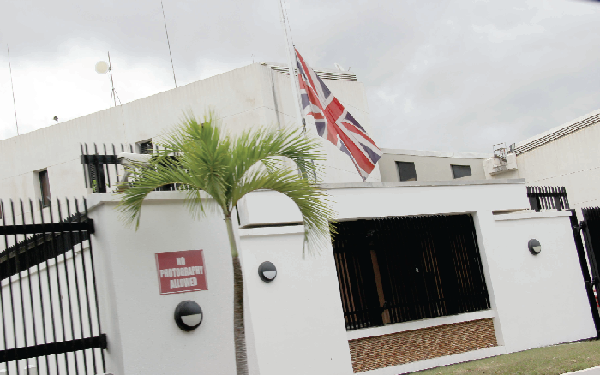
Diplomatic missions mourn Kofi Annan
Flags are flying at half-mast at the forecourts of diplomatic missions in the country in honour of the late Kofi Annan who was the Secretary-General of the United Nations (UN) for 10 years.
Advertisement
But there were some of the world’s most powerful nations whose flags were flying at full mast when the Daily Graphic went round the diplomatic enclaves to check how the missions were mourning a son of the soil who had run the UN from January 1997 to December 2006.
The list included four permanent members of the UN Security Council — the United States, France, China and Russia.
Others were Canada, Italy, Saudi Arabia, Mexico and some African countries, namely Togo, Zimbabwe and South Sudan.
There were, however, no flags on the flag poles at the Cuban and Kuwaiti missions.
The value
Globally, flying national flags at
In the US, by the order of the President, the Stars and Stripes
In the event of the death of other officials or foreign dignitaries, the flag is displayed at half-mast, according to presidential instructions or orders or in accordance with recognised customs or practices not inconsistent with the law.

The European Union office
Ghana follows a similar tradition of flags being flown at half-mast by the orders of the President when he declares national mourning for national figures and victims of national disasters.
In recent times, the declaration was made as the nation mourned the late President J.E.A. Mills, Madam Theodosia Okoh, former Vice-Presidents Aliu Mahama, Kwesi Amissah-Arthur, and Mr J.H. Mensah.
In recognition of Mr Annan’s stature and to mourn him, President Akufo-Addo directed that Ghana’s National Flag should fly at half-mast across the country and in all the country’s diplomatic missions across the world from yesterday for one week in honour of the celebrated statesman.
Why it is done
While its origin may be unclear, the tradition of flying flags at half-staff or half-mast has developed important meaning over time.
According to the website: study.com, many historians point to a British expedition to Canada in 1612 aboard the ship Heart's Ease. The captain, James Hall, was killed by an Inuit spear and the crew lowered the ship's flag to half-mast. That might have partly been to signal those who had gone inland that something had gone wrong, but sailor superstitions might also have played a role.
According to tradition, the ship's flag was put at half-mast to make room for the invisible flag of death. In fact, when the ship returned to London, the ship's flag was still at half-mast, implying that the crew was still sailing under death's flag.
Biography
Mr Annan was the seventh Secretary-General of the UN and Founder and Chair of the Kofi Annan Foundation.
For two years (1974 to 1976) he left international duty to work as the Director of the Ghana Tourist Development Company in Ghana.
In 2001, he and the United Nations were jointly awarded the Nobel Prize for Peace.
He was praised for being “pre-eminent in bringing new life to the organisation”. (Norwegian Nobel Committee, October 2001)
With the Kofi Annan Foundation, he mobilised political will to overcome threats to peace, development and human rights.
Mr Annan believed that the expertise and evidence needed to solve pressing problems such as poverty, violent conflict and poor governance in most cases already existed, saying that progress was held back too often due to lack of leadership and the political will to use them to identify and deliver solutions.
Early career
Mr Kofi Annan joined the UN system in 1962 as an administrative and budget officer with the World Health Organisation in Geneva. He later served with the Economic Commission for Africa in Addis Ababa, the UN Emergency Force (UNEF II) in Ismailia, the UN High Commission for Refugees (UNHCR) in Geneva and in various senior posts in New York, dealing with human resource, budget, finance and staff security.
Immediately before becoming UN Secretary-General, he was
Annan was born in Kumasi, Ghana, on April 8, 1938.
He is survived by Nane and three children.



